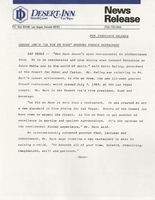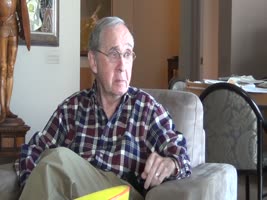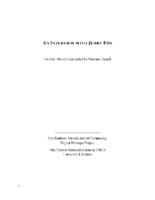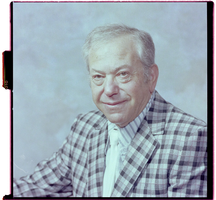Search the Special Collections and Archives Portal
Search Results

Transcript of interview with Janellen Radoff by Barbara Tabach, September 26, 2016
Date
Archival Collection
Description
Jane Radoff?s sophisticated eye and creative energy follow her wherever she goes. Her interior designs have anonymously touched most all who have walked through many of the Strip casinos and hotels. Her working partnership with interior designer Roger Thomas for Steve Wynn properties are among the most iconic of recent era. Born 1940 in Pittsburgh, PA, to Adelaide and Meyer Sachs, Jane was destined to lead a colorful life. Her mother was a local radio/TV personality with her own show and her father was successful real estate entrepreneur. Jane attended the University of Michigan where she honed her design skills. Before moving to Nevada, Jane?s career path included Restaurant Associates, a short stint as a girl Friday for Johnny Carson, and freelance product design while starting a family. Then in 1978, her husband William ?Bill? Radoff accepted a purchasing director position from Billy Weinberger and Neil Smythe at Caesars. With her signature wry humor, she reflects on her early observations of Las Vegas, and eventually working with Roger Thomas. In time, the duo worked together to bring groundbreaking interiors to the Strip, primarily with Steve Wynn. As most Jewish transplants, the Radoffs first belonged to Temple Beth Sholom. Later she was the interior inspiration for Congregation Ner Tamid where Jon Sparer did the architectural design. She is a quiet icon of Las Vegas?s turn to elegance and warmth in design of public spaces.
Text

Transcript of interview with Bobby Morris by Barbara Tabach, March 24, 2016
Date
Archival Collection
Description
In this interview, Morris reflects upon his career and the wide range of influential artists he has worked with, as a drummer, musical director and talent manager. Stories include playing with Louis Prima, live and on albums; serving as Elvis? musical director; filling in for Frank Sinatra?s drummer; entertaining Howard Hughes; and playing at President John F. Kennedy?s inauguration, to name a few. He also talks about his agency, attributing its success to the strong relationships he built with casino management.
Text

Transcript of interview with Bobby Morris by Cork Proctor, September 7, 2004
Date
Archival Collection
Description
This interview conducted by Cork Proctor and is part of the Arnold Shaw Collection at UNLV University Libraries Special Collections. It has been added to the Southern Nevada Jewish Heritage Project with Mr. Morris?s permission. In this conversation, Morris reflects upon his career, how he got started as a musician, and the wide range of influential artists he has worked with over the years, as a drummer, musical director and talent manager. Stories include playing with Louis Prima, live and on his albums; serving as Elvis? musical director; filling in for Frank Sinatra?s drummer; entertaining Howard Hughes; and playing at President John F. Kennedy?s inauguration.
Text

News release, brochure and photograph of the opening of La Vie en Rose (restaurant) at the Desert Inn, 1990
Date
Archival Collection
Description
La Vie en Rose was a gourmet French restaurant in the Desert Inn Hotel and Casino, conceived by celebrity chef Nat Hart.
Mixed Content

Video of interview with Arthur "Art" Marshall by Claytee D. White, February 11, 2014
Date
Archival Collection
Description
Arthur "Art" Marshall discusses early life in Las Vegas, the financing of Las Vegas casinos, and his involvement in the Jewish community.
Moving Image

Transcript of interview with Arlene Blut by Barbara Tabach, May 28, 2015
Date
Archival Collection
Description
In this interview, Arlene discusses her family and important friendships; her relations with and impressions of the disparate Las Vegas Jewish communities; the meaningful ways her Jewish relationships in Duluth, Winnipeg, and Las Vegas intertwine; her theatrical, professional, and philanthropic work; the reasons she and Jerry became active Zionists; and their support for Israeli causes. Her liberal sprinkling of Yiddish terms enriches her speech as it exemplifies her deep cultural attachment to and identification with her Jewish heritage, despite the fact that her wide and diverse circle of friends remains predominantly non-Jewish.
Actor, director, friend, mother, producer, wife, and volunteer extraordinaire Arlene Piekoff (now Blut) arrived in Las Vegas in 1971 with two young children and husband, Michael Peikoff, who was opening a surgical practice. Arlene was born and raised in Duluth, Minnesota, where she attended a Conservative Jewish temple but had mostly non-Jewish friends. She met Michael at the University of Minnesota, and they married before he began medical school in Winnipeg, Manitoba, Canada. Arlene and Michael followed his residencies and fellowships to California, Michigan, and Manitoba before they came to Las Vegas Through her brother in law and Ayn Rand?s intellectual heir, Leonard Peikoff, Arlene was exposed to Ayn Rand Objectivism, a philosophy that still influences her political outlook. After her 1975 divorce she began working at the Jockey Club; founded the Meadows Playhouse, Las Vegas?s first professional black box theater; and started Renta Yenta, the valley?s first full-service event planning business. In 1980 she married tax attorney Jerry Blut in a Renta-Yenta-produced, Fiddler-on-the-Roof-themed wedding at Paul Anka's Jubilation Restaurant.
Text

Transcript of interview with Jerry Fox by Barbara Tabach, November 12, 2014
Date
Archival Collection
Description
Interview with Jerry Fox by Barbara Tabach on November 12, 2014. In this interview, Fox discusses his father's restaurant, Foxy's Delicatessen, which opened on the Las Vegas Strip in the 1950s, and his own business endeavors including the Tinder Box and an embroidery business.
Jerry Fox grew up in Los Angeles until his family moved to Las Vegas in February 1955, where his father opened Foxy's Delicatessen, the city's first Jewish deli. Jerry would go on to follow in his father's entrepreneurial footsteps, operating several ventures across different industries, including his own restaurant, Foxy Dog. Jerry sold Foxy Dog in 1975 after going through a divorce, the same year that Foxy's Deli closed.
Text

Photographs of Mike Shapiro, Las Vegas (Nev.), July 02, 1980
Date
Archival Collection
Description
Portrait photographs of Mike Shapiro, vice president of the Union Plaza, now known as the Plaza Hotel and Casino, in Las Vegas, Nevada. 120mm negatives.
Image

Transcript of interview with Irwin Molasky by David G. Schwartz, April 23, 2014
Date
Archival Collection
Description
Interview with Irwin Molasky by David G. Schwartz, April 23, 2014. In this interview, Irwin Molasky discusses arriving in Las Vegas in the 1950s, and building the Pyramids motel on the Strip. He talks about the entertainers in various hotels on the Strip, the concept of the "star policy," and bringing Parisian shows to Las Vegas. He goes on to discuss his real estate developments, including Paradise Palms, Boulevard Mall, and Sunrise Hospital, and donating the land for the development of UNLV.
Irwin Molasky came to Las Vegas in 1951, during a time when "everyone knew everyone else," and there was a small, but strong Jewish community. An Army veteran, Irwin and his wife moved to Las Vegas after living in California for a short time. Irwin soon built The Pyramids, a Strip motel next to the Flamingo Hotel and Casino. The Pyramids opened the same day as its northern next-door neighbor, The Sands Hotel and Casino, on December 15, 1952. Irwin used his newly acquired contractor's license to become on the city's most important real estate developers. Over the next 60 years, he built everything from residential housing, including Paradise Palms to commercial properties. Projects included Sunrise Hospital and the surrounding medical buildings; Sunrise City Shopping Center and other power centers; Bank of America Plaza and much other downtown development; and golf courses. When the recession hit, Irwin began bidding on government projects across the country, successfully shielding his business and employees from the economic downturn. Irwin's real estate ventures not only had a tremendous impact on Las Vegas' economic development, but a substantial effect in social programming. Irwin donated 40 acres of prime real estate to the University of Nevada - Las Vegas (UNLV) so that university could expand. Additionally, he was the Founding Chairman of the UNLV Foundation and received an honorary doctorate in humanities.
Text

Transcript of interview with Rabbi Bradley Tecktiel by Barbara Tabach, April 19, 2016
Date
Archival Collection
Description
Rabbi Bradley Tecktiel was born June 28, 1968 in Chicago, Illinois. He moved to New York City to attend university, where he received two Bachelor of Arts degrees: one from List College and one from Columbia University. He went on to achieve a Master?s degree from the Jewish Theological Seminary. Soon after graduating in 1996, Rabbi Tecktiel accepted his first clergy position in New Rochelle, New York. From there he went on to lead a congregation in Louisville, Kentucky, before eventually moving to Las Vegas to become the spiritual leader of Midbar Kodesh Temple in 2008. In this interview, Rabbi Tecktiel discusses the path that eventually brought him, his wife, Susan, and their three children to Las Vegas. He talks about his passion for developing Jewish community engagement and programming, and specifically about Midbar Kodesh Temple initiatives, including Yom HaShoah and educational programming. In addition, Rabbi Tecktiel reflects upon the growth of the Jewish community, both those affiliated and unaffiliated, and the impact of Jews on Las Vegas?, as well as Nevada?s, development.
Text
